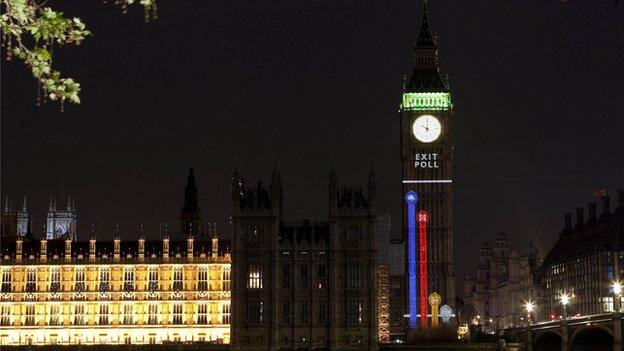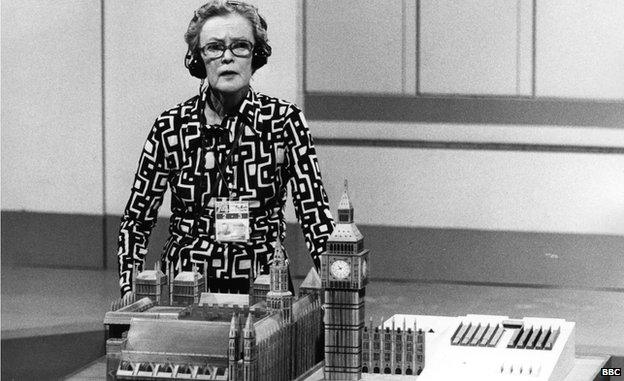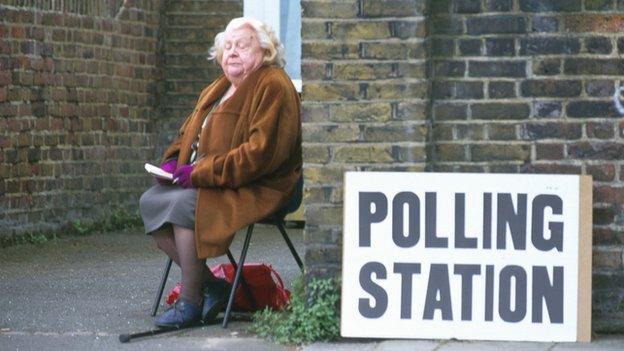Election 2015: The highs and lows of election exit polls
- Published

The 2010 exit poll result was a shock to broadcasters, but an accurate picture
National exit polls have been used to predict the results of British general elections for 40 years, with mixed results.
The 2010 exit poll result was as near perfection as one is likely to reach - but was greeted by fifty shades of disbelief as soon as it was published.
At 10pm - just as the polls were closing - an exit poll suggested a hung parliament with the Conservative Party 19 seats from a controlling majority. Many hours later, the actual results confirmed this to be true.
Commentators had been surprised by the apparent poor prospects of the Liberal Democrats who had been performing well in polls in the run-up to the election.
It may be that the 2015 exit poll will face the same scepticism: the political landscape it will be measuring is certainly more challenging than five years ago.
But before battle commences, it is worth acknowledging that our national exit polls are the biggest exercises in polling in a single day we will ever witness.
In 2010, between 7am and 10pm, more than 16,000 voters across Britain were interviewed and their decisions recorded and processed so that their collective verdict could be delivered at 10pm that evening.
BBC/ITV News/Sky News 2010 exit poll
The 2005 result illustrates how random chance plays a part in polling as in so much else in life.
BBC/ITV News 2005 exit poll
In earlier elections, there were some remarkably accurate results and car crashes. In October 1974, the BBC predicted a 132 majority for Harold Wilson's Labour party.
The actual result was a three seat majority. (ITN were much, much closer).
The BBC's poll in 1983 and 1997 were remarkably accurate, but in 1992 both ITN and the BBC predicted a hung parliament.
John Major's Conservative Party government had, in fact, held its position, albeit with a significantly reduced majority.

The results studio from which the BBC presented night-long coverage of the 1974 autumn election. Pollsters were way off the mark this time
How exit polling works
The BBC and ITN used different pollsters from 1974 right up until 2005 when they agreed to a joint exit poll conducted by MORI and NOP.
In 2010, Sky News joined the other two broadcasters in sponsoring the exit poll and this triumvirate continues for the 2015 general election exit poll, which will also be conducted by MORI and NOP.
In some elections before 1997 there were two exit polls: one for seat prediction, which simply asked how voters exiting polling stations had voted; and the analysis exit poll which asked voters a short series of questions to discover why the nation had voted the way it did.
Both types were based on a small selection of polling stations throughout Britain but the samples were distinctly different.
The seat prediction exit poll only sampled polling stations in marginal seats because its sole purpose was to predict the actual outcome of the election that would be decided in the relatively small number of seats with a history of changing hands from one party to another.
The analysis poll was conducted in a set of polling districts designed to provide a representative national sample because its purpose was to deliver a snapshot of the views of all voters - those voting in every type of seat, not just in marginal ones.
Analysis polls were abandoned after the 1992 general election and since then there have only been seat prediction exit polls.
Exit polls do not engage every voter at the selected polling stations.

There may be a long wait for actual results in this general election so broadcasters will be relying on exit polls for longer
The pollsters approach one voter out of a "given number", such as six, eight or 10, based on an estimated national turnout agreed in advance between the polling companies and the broadcasters.
And because the exit poll is conducted in a small fraction of the 39,000 polling stations in Britain, it is inevitably subject to a margin of error.
Prior to 1997, exit poll predictions were replaced relatively quickly by a fast-flowing tide of real results.
However, the flow of results has slowed dramatically since 1992 because of the local elections in England held on the same day.
On 7 May, we have the largest ever set of local elections alongside the general election.
It would appear that we will be relying on the exit poll predictions for some hours before enough results have been declared to safely dispense with it.
Times of result declarations 1992-2010
Figures in tables provided by Chris Long, of ITN election programmes
Subscribe to the BBC Election 2015 newsletter, external to get a round-up of the day's campaign news sent to your inbox every weekday afternoon.